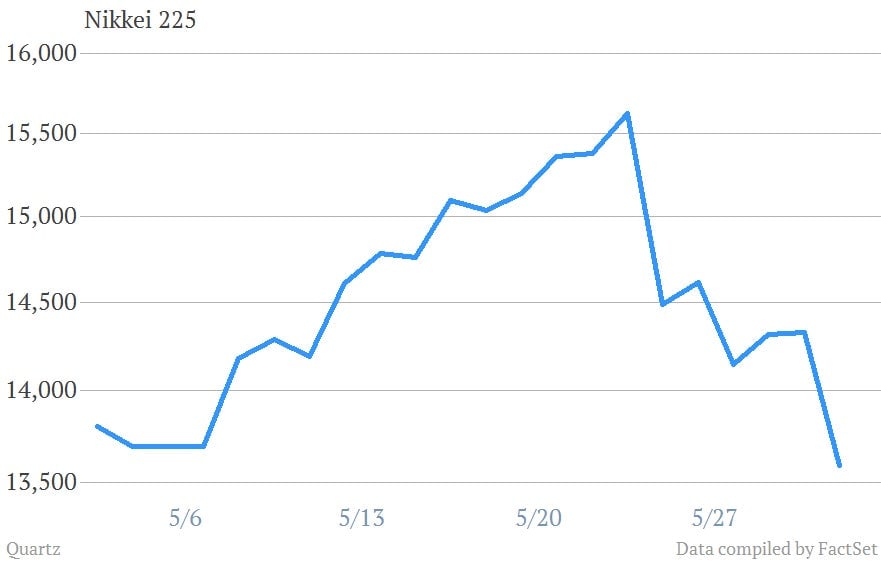As the Nikkei 225 plummets again today, investors begin to doubt Abenomics
Today’s selloff in the Japanese stock market—the Nikkei 225 index fell 5.2% today—has many worried that a bigger drop lies in wait, particularly after last 7% drop.

Today’s selloff in the Japanese stock market—the Nikkei 225 index fell 5.2% today—has many worried that a bigger drop lies in wait, particularly after last 7% drop.
The question is whether the implosion comes signifies worries about Abenomics and the fundamentals of the Japanese economy; the selloff comes on the eve of a slew of economic data announcements.
One theory about what’s driving the drop involves Japan’s volatile bond market. Money Morning notes that shares of consumer lenders took a particularly big hit, possibly because investors fear that rising bond yields will cut into lenders’ Tier 1 capital. Shares of banks on the TOPIX index have also fallen since mid-May, as highlighted by Deutsche’s Jim Reid. (That said, the drop in the Nikkei actually calmed the bond markets; 10-year yields are back down to 0.89% after spurring panic last week when they hit 1%.)
The dip could be short-lived, and here’s why: foreign investors and short-term Japanese traders have been driving the Nikkei surge, and they contributed to its decline (foreign purchases of Japanese stocks have slowed in the last week). The Wall Street Journal reports that short-term Japanese traders contributed around 40% of trading volume by value last week, double what it was eight months ago. That may leave room for longer-term domestic investors sitting on the sidelines to enter the market, offsetting the flight of foreign investors.
One positive sign for Abenomics: Japanese investors were net sellers of long-dated foreign bonds last week, which suggests a possible shift into higher-yield assets. As we’ve discussed recently, that’s a big goal of Abenomics. What’s more, Reuters reports that Japan’s massive public pension fund, which manages more than $1 trillion, is considering expanding its allowed investment in domestic stocks. For now, Japanese government bonds make up the bulk of its portfolio. But paying pensions to Japan’s growing senior population will require bigger returns. Stay tuned for an announcement on its decision next month.